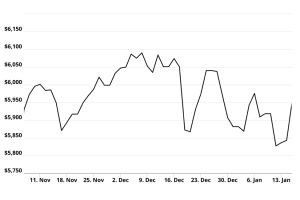
Picking the best digital banking stocks is a little like picking your favorite shirt — different occasions demand different clothing, and different use cases require different digital payment processors. Still, today’s best digital payment stocks proactively blend stable, ongoing operations with forward-thinking initiatives to capture new market segments and adapt to emerging digital payment processing trends.
Cash was one king, but no longer — 90% of polled consumers used digital payment platforms in 2023, the highest rate on record after rapidly accelerating throughout the pandemic. Moreover, even as in-store shopping returned, the best digital payment stocks adapted to the trend and offer in-store digital payments in lieu of legacy cash or credit cards.
Though a handful of startups tried to make make waves in the space, the best digital payment stocks enjoy a dominant position in their respective categories alongside the size and longevity to stamp out competition.
PayPal (PYPL)

PayPal (NASDAQ:PYPL) continues to maintain a dominant position among the best digital payment stocks, despite recent share declines of 3% since January. Holding over 45% of the global market, PayPal far outpaces its nearest competitor, Stripe, which holds 18.2%. With projections indicating a 65% increase in total online sales revenue by 2028, PayPal is well-positioned for significant growth. The rise of digital payment processing is undeniable, and PayPal is set to strengthen its market leadership as this trend continues.
PayPal is undergoing a strategic overhaul, bringing in new executives and managers to focus on talent development and strategies. The company is also realigning its operations to better serve three key segments: consumers, small businesses, and enterprise clients. This targeted approach aims to enhance customer experience and more effectively meet each group’s specific needs.
By optimizing its operations and aligning with the growth of online shopping, PayPal is positioning itself for long-term success. The company’s current streamlining efforts are expected to yield significant benefits in the future, reinforcing its status among the best digital payment stocks
Block (SQ)

Block (NYSE:SQ) is reinforcing its position among the best digital payment stocks by renewing its emphasis on forward-thinking tech, including crypto. Recently, the fintech company began rolling out its BitKey physical crypto wallets after a period of beta testing. The “Not your keys, not your crypto” concept resonates with customers who prefer self-custody over third-party custodianships like CashApp, particularly in light of the FTX debacle. BitKey offers a unique blend of accessibility, allowing transactions through a digital app, physical hardware and an emergency access option via Block’s servers to safeguard against theft or loss.
Despite a challenging 2024 with shares under pressure due to broader economic concerns and monetary policy, Block remains one of the best digital payment stocks across the fintech sector. The company manages to blend the stability of a large enterprise with the nimbleness and innovation typical of startups.
Block’s first-quarter report showcased a significant 22% year-over-year increase in gross profit and improved margins across the board. The company also saw a fourfold increase in net income, positioning Block among the best digital payment stocks today.
Visa (V)

Visa (NYSE:V) might seem like an unlikely candidate among the best digital payment stocks, given its status as a legacy firm fighting against a slew of upstarts and startups looking to unseat mature credit card processors by beating them to digital payment processing. However, Visa continues to innovate within the mature market of cashless payment processing, where it already commands about 20% of the global market share.
Visa isn’t resting on its laurels. The company is adapting to the rise of digital currencies and the shift to online transactions. Currently, Visa focuses on enterprise-level clients to simplify spending under corporate accounts, a critical move as corporate credit represents the largest share of revolving credit utilization and continues to grow. While consumer payment processing enhances daily convenience, the true financial potential lies in B2B transactions—a market Visa is strategically targeting.
Ultimately, despite its size and maturity, Visa’s dominant position helps it navigate around new entrants trying to take the throne, and a renewed emphasis beyond just consumer digital payment processing is a major step forward.
On the date of publication, Jeremy Flint held no positions in the securities mentioned. The opinions expressed in this article are those of the writer, subject to the InvestorPlace.com Publishing Guidelines.
On the date of publication, the responsible editor did not have (either directly or indirectly) any positions in the securities mentioned in this article.




